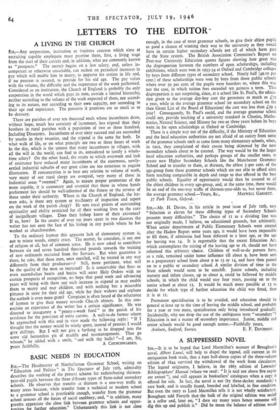BASIC NEEDS IN EDUCATION
Sin,—The Headmaster of Northallerton Grammar School, writing on "Education and Politics" in The Spectator of July 12th, admirably describes the working of the present scheme for redistributing thirteen- year-old pupils between the three different types of State-aided secondary schools. He observes that transfer at thirteen is a one-way traffic in many areas because, while transfer from a technical or modern school to a grammar school is practicable enough, transfer from the grammar school arouses all the forces of social snobbery, and, " in addition, many parerlts appreciate the close link between grammar schools and oppor- Ilmities for further education." Unfortunately this link is not close
enough, in the case of most grammar schools, to give their ablest pupils as good a chance of winning their way to the university as they would have in certain higher secondary schools not all of which form part of the State system. The British Association Committee's Report on Post-war University EdUcation quotes figures showing how great was
the disproportion between the numbers of open scholarships, including exhibitions, which were won in 1933-34 at Oxford and Cambridge colleges by boys from different types of secondary school. Nearly half (49.10 per cent.) of these scholarships were won by boys from those public schools where over so per cent. of the pupils were boarders or, where this was not the case, in which tuition fees exceeded ten guineas a term. This disproportion is not surprising, since, at a school like St. Paul's, the educa- tion given to the average day-boy cost the governors as much as £70 a year, while in the average grammar school (or secondary school on the then Grant List of the Board of Education) the cost was less than £29 a year! Consequently, St: Paul's could, and the average grammar school could not, provide teaching of a university standard in Classics, Mathe- matics, Natural Science, and History for two or three years before its boys went in for open scholarships at Oxford or Cambridge.
There is a simple way out of the difficulty, if the Ministry of Education and the local education authorities are not afraid of an outcry from some of the grammar schools such as came from many elementary schools, when, in 1902, they complained of their cream being skimmed by the new secondary schools about to be created. The way would be for the larger local education authorities, and perhaps groups of the smaller ones, to create new Higher Secondary Schools like the Manchester Grammar School and to transfer to them, at thirteen, the ablest 3 per cent. -of the age-group from those grammar schools which are not able to afford sixth form teaching comparable in depth and range to that offered in the best public schools. Equality of opportunity would then be assured to all the ablest children in every age-group, and, at the same time, there would be an end of the one-way traffic of thirteen-year-olds to, but never from,


























 Previous page
Previous page